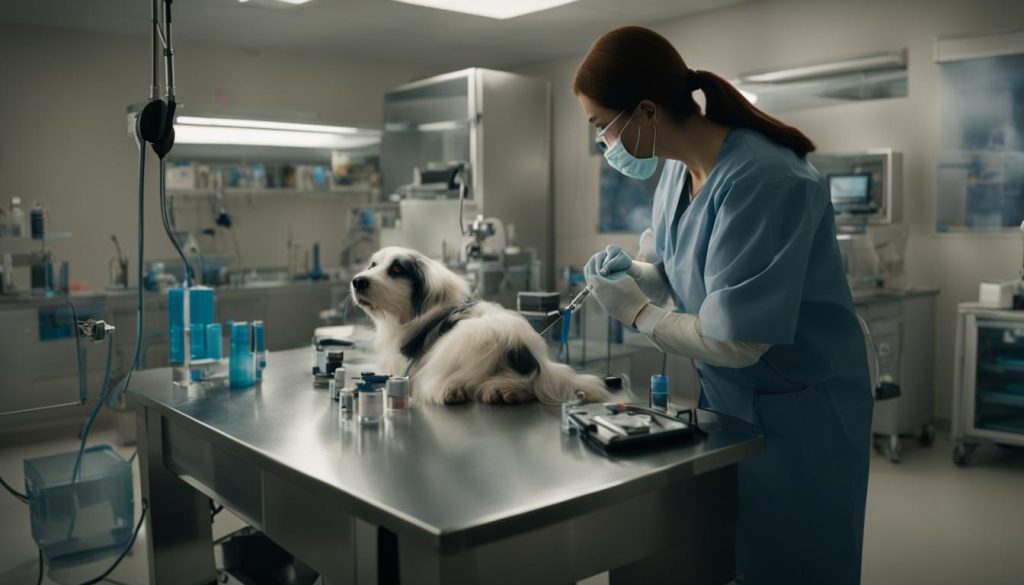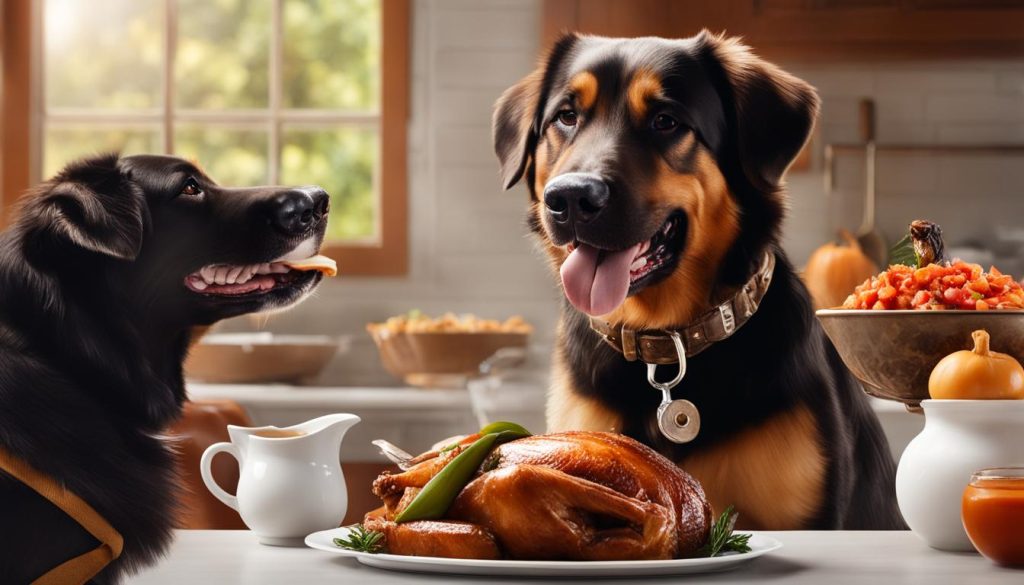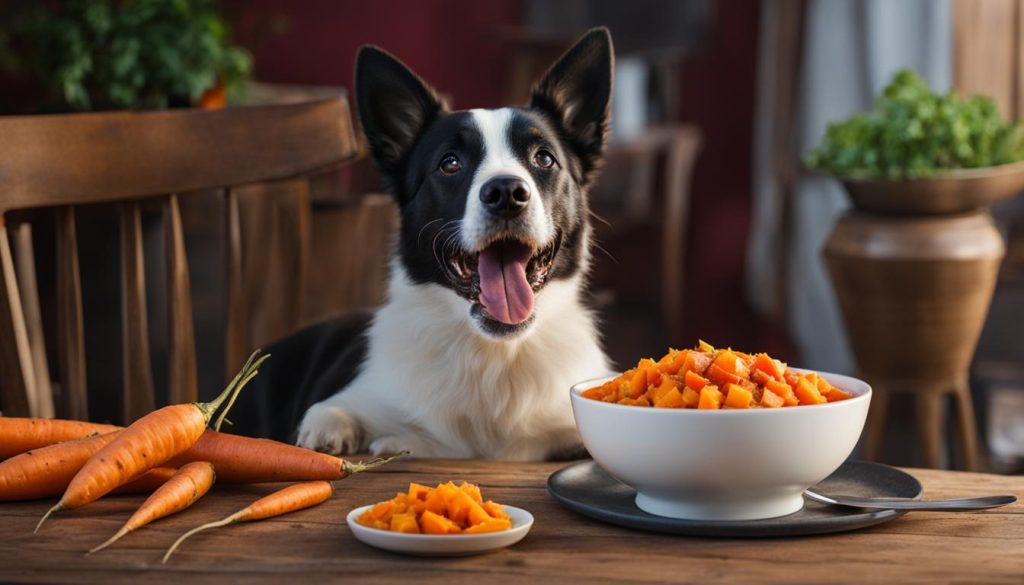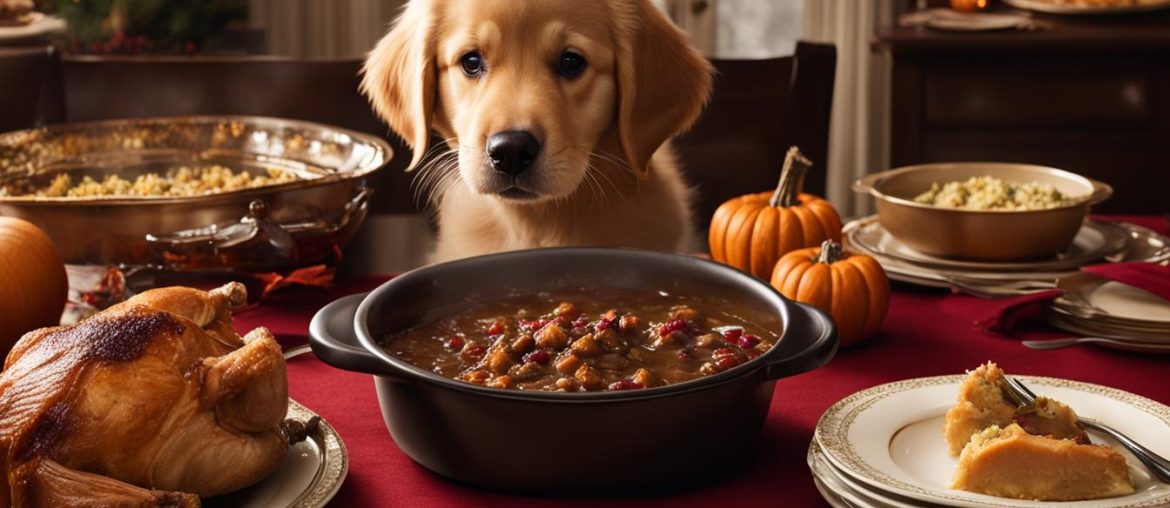Gravy is a popular addition to many human meals, but can dogs safely enjoy this savory treat? As a responsible pet owner, it’s crucial to understand the compatibility of certain foods with your canine companion’s diet. In this comprehensive guide, I will delve into the topic of dogs and gravy to help you make informed decisions about what’s safe and healthy for your furry friend.
When it comes to canine nutrition, not all ingredients found in gravy are safe for dogs. While some types of gravy can be consumed in moderation without any adverse effects, there are others that can pose health risks. It’s important to be aware of these risks to ensure the well-being of your pet.
Key Takeaways:
- Dogs can eat certain types of gravy in moderation, but it’s important to be cautious of the ingredients.
- Consuming too much gravy can lead to upset stomach, vomiting, diarrhea, food allergies, or food poisoning in dogs.
- Gravies containing ingredients like onion powder, garlic powder, processed cheeses, and high levels of fat or salt should be avoided.
- Healthier alternatives to traditional gravy include homemade dog-friendly gravies and carefully selected commercial options.
- If your dog exhibits adverse reactions after consuming gravy, it’s best to consult a veterinarian for proper diagnosis and treatment.
What Happens If My Dog Eats Gravy?
When dogs consume gravy, it can have various effects on their health. While some dogs may tolerate small amounts of gravy without any issues, others may experience negative reactions. It’s important to consider dog food compatibility and potential food allergies before introducing gravy into their diet.
Consuming too much gravy can lead to an upset stomach, mild vomiting, diarrhea, food allergies, or even food poisoning in dogs. These reactions are primarily caused by the ingredients present in the gravy. Dogs can have different sensitivities and reactions to certain ingredients, so it’s crucial to be cautious and observant when feeding them this popular condiment.
The severity of the reaction depends on the specific ingredients in the gravy. Some ingredients commonly found in gravies, such as onion powder, garlic powder, processed cheeses, canned broths, and bacon bits, can be harmful to dogs if consumed in large quantities. These ingredients can cause toxicity, high-fat content, high-salt content, and digestive issues in dogs.
| Common Ingredients in Gravy | Potential Effects on Dogs |
|---|---|
| Onion Powder/Garlic Powder | Toxicity, digestive issues |
| Processed Cheeses | High-fat content, digestive issues |
| Canned Broths | High-salt content, digestive issues |
| Bacon Bits | High-fat content, digestive issues |
It’s essential to monitor your dog’s reaction to gravy and discontinue feeding it if any adverse symptoms occur. If you suspect your dog has consumed a large amount of gravy or is experiencing severe symptoms such as persistent vomiting, diarrhea, lethargy, or other unusual signs, it is recommended to seek veterinary care immediately. A veterinarian can diagnose any potential problems and provide appropriate treatment to ensure your dog’s well-being.
Gravy Ingredients to Avoid & Why
When it comes to feeding your dog gravy, it’s important to be aware of certain ingredients that can be harmful to their health. The following table highlights the dangerous ingredients found in gravies and explains why they should be avoided:
| Ingredients | Reasons to Avoid |
|---|---|
| Onion Powder | Contains compounds that can damage a dog’s red blood cells and lead to anemia. |
| Garlic Powder | Similar to onion powder, garlic can also cause damage to a dog’s red blood cells and lead to anemia. |
| Processed Cheeses | High in fat and salt, processed cheeses can contribute to obesity and raise blood pressure in dogs. |
| Canned Broths & Bouillons | These products often contain added salt, which can be detrimental to a dog’s health if consumed in excess. |
| Bacon Bits | Bacon is high in fat and can cause pancreatitis or digestive issues in dogs. |
| Cooked Onions | Just like onion powder, cooked onions can damage a dog’s red blood cells and lead to anemia. |
| Sour Cream | Sour cream is high in fat and can cause digestive upset and obesity in dogs. |
| Butter | Butter is high in fat and can contribute to obesity and pancreatitis in dogs. |
These ingredients can be harmful to dogs if consumed in large quantities. It’s important to read the ingredient labels on gravies and avoid any products that contain these toxic ingredients. By being cautious about the ingredients in gravies, you can ensure the safety and well-being of your furry friend.
Remember, high-fat and high-salt content in gravies can lead to a variety of health issues in dogs, including obesity, pancreatitis, and digestive upset. If you’re unsure about whether a gravy is safe for your dog to consume, it’s always best to consult with your veterinarian for guidance.
Healthier Alternatives to Gravy
While traditional gravy may not be the best option for dogs due to certain harmful ingredients, there are several healthier alternatives that pet owners can consider. By making homemade dog gravy or exploring dog-friendly gravy recipes, you can provide a safe and tasty addition to your dog’s meals.
One option for a homemade dog gravy is to create a beef or chicken broth-based gravy using low-sodium bouillon cubes and fresh herbs. This can add flavor to your dog’s food without the excessive fat and salt found in traditional gravies. Another alternative is to make a porridge-style gravy using cooked oatmeal, stock or water, diced carrots, and mashed banana for sweetness. This provides a nutritious and easily digestible option for dogs.
Please be aware that when making homemade gravy, it’s crucial to avoid using any ingredients that are toxic or harmful to dogs, such as onion and garlic. Always consult a veterinarian or do thorough research to ensure the ingredients you use are safe for your furry friend.
| Homemade Dog Gravy Recipe |
|---|
| Serving Size: Makes approximately 2 cups of gravy |
| Ingredients: |
| – 2 cups of low-sodium beef or chicken broth |
| – 1 tablespoon of cornstarch or flour (for thickening) |
| – Fresh herbs such as parsley, thyme, or rosemary (optional) |
| Instructions: |
| 1. In a saucepan, heat the low-sodium broth over medium heat. |
| 2. In a separate bowl, mix the cornstarch or flour with a small amount of water to create a slurry. |
| 3. Slowly add the slurry to the heated broth while stirring continuously. |
| 4. Continue stirring until the gravy thickens to the desired consistency. |
| 5. If desired, add fresh herbs for additional flavor. |
| 6. Allow the gravy to cool before serving it to your dog. |
What to Look for In a Healthy Food Topper?
When it comes to choosing a food topper for your beloved canine companion, it is important to prioritize their health and well-being. Look for food toppers that are made with natural ingredients and free from artificial additives. Natural ingredients provide essential nutrients and minimize the risk of allergies or digestive issues in dogs.
Avoid food toppers that contain artificial preservatives, flavors, or colors, as these additives can be harmful to your pet’s health. Artificial preservatives such as BHA, BHT, and ethoxyquin have been linked to various health problems in dogs. Opt for food toppers that use natural preservatives like Vitamin E or rosemary extract.
Additionally, check the ingredient list for any potential allergens that your dog may have sensitivities to. Common allergens in food toppers include wheat, soy, and corn. If your dog has known food allergies or sensitivities, choose a food topper that is specifically formulated to address those needs.
To ensure the highest quality and safety standards, look for food toppers that are produced by reputable pet food companies. These companies often perform rigorous testing and adhere to strict quality control measures to provide the best products for your furry friend.
Table: Comparison of Popular Food Toppers for Dogs
| Brand | Natural Ingredients | No Artificial Additives | Allergen-Free |
|---|---|---|---|
| Brand A | Yes | Yes | No |
| Brand B | Yes | No | Yes |
| Brand C | No | Yes | No |
Table: Comparison of popular food toppers for dogs, highlighting the presence of natural ingredients, absence of artificial additives, and allergen-free options. This table can help pet owners make an informed decision when choosing a food topper for their furry friends.
Veterinary Care for Dogs: When to See the Vet

While feeding gravy to your dog can be a tasty treat, it’s important to be aware of the potential risks and know when to seek veterinary care. Dogs may sometimes have adverse reactions to certain ingredients in gravy, leading to digestive issues or other health problems. If you notice any signs of adverse reactions in your dog after consuming gravy, it’s crucial to contact a veterinarian for guidance and assistance.
Signs of adverse reactions in dogs can vary but may include persistent vomiting, diarrhea, lethargy, loss of appetite, excessive drooling, or any other unusual symptoms. These symptoms can indicate an underlying health issue or potential toxicity, especially if the gravy contained harmful ingredients like onion or garlic powder. It’s always better to err on the side of caution and seek professional veterinary care to ensure the well-being of your furry friend.
When you contact a veterinarian, they will be able to assess your dog’s condition, provide a proper diagnosis, and recommend the appropriate treatment. They may conduct a physical examination, run tests, or ask for additional information about the gravy and the quantity ingested. It’s essential to be honest and provide accurate details to help the veterinarian make an informed decision regarding your dog’s health.
| Signs of Adverse Reactions | Veterinary Care |
|---|---|
| Persistent vomiting | Contact a veterinarian for guidance and assistance |
| Diarrhea | Seek professional veterinary care to ensure your dog’s well-being |
| Lethargy | Be aware of potential risks and know when to seek veterinary help |
| Loss of appetite | Consult a veterinarian to assess your dog’s condition |
| Excessive drooling | Provide accurate details to help the veterinarian make informed decisions |
| Unusual symptoms | Make sure to be honest and provide accurate information |
Remember, when it comes to your dog’s health, it’s important to trust professional advice and consult a veterinarian. They have the expertise and knowledge to determine the best course of action for your pet’s well-being. By seeking veterinary care at the right time, you can ensure that any potential issues related to gravy consumption are addressed promptly and effectively.
Safety of Turkey Gravy for Dogs: What You Need to Know

When it comes to feeding your furry friend, it’s important to ensure that their diet is safe and free from harmful ingredients. Turkey gravy, a popular addition to holiday meals, may be tempting to share with your dog. However, it is crucial to understand the potential risks associated with feeding them this tasty treat. Turkey gravy often contains ingredients that can be harmful to dogs, such as high-fat content, onion or garlic powder, and spices.
The high-fat content in turkey gravy can lead to digestive issues and even pancreatitis in dogs. Additionally, onion and garlic powder, which are commonly used in gravy recipes, can cause toxicity in dogs, leading to symptoms such as vomiting, diarrhea, and difficulty breathing. Spices used in gravies can also irritate your dog’s stomach and cause discomfort.
To prioritize your dog’s health and safety, it is best to avoid feeding them traditional turkey gravy. Instead, opt for dog-friendly alternatives or homemade gravies made with safe ingredients. By choosing these options, you can ensure that your furry friend enjoys a delicious and nutritious meal without any negative consequences.
Remember, when it comes to your dog’s well-being, it is always better to be safe than sorry. If you suspect that your dog has consumed turkey gravy or any other potentially harmful food, keep an eye out for any signs of distress. If your dog exhibits symptoms such as vomiting, diarrhea, or unusual behavior, it is crucial to contact your veterinarian immediately for guidance and necessary treatment.
Can Dogs Have Commercial Gravy?
When it comes to commercial gravy, pet owners need to exercise caution. Most commercially available gravy mixes sold in stores contain ingredients that can be harmful or toxic to dogs. These ingredients include garlic and onion powder, potato starch, palm oil, skimmed milk powder, refined wheat flour, and sugar. Feeding dogs gravy made with these ingredients can lead to digestive issues, food allergies, and other adverse reactions.
Dogs are more sensitive to certain ingredients that are commonly found in commercial gravies. For example, garlic and onion powder can cause red blood cell damage and lead to anemia in dogs. Excessive salt content in gravies can also be problematic, as it can contribute to dehydration and increased blood pressure in dogs. Additionally, some commercial gravies may contain additives or preservatives that can be harmful to dogs’ overall health.
As a responsible pet owner, it is important to prioritize your dog’s health and well-being. Instead of feeding your dog commercial gravy, consider safer alternatives such as homemade dog-friendly gravy or commercially available gravies specifically formulated for canine consumption. By opting for healthier options, you can ensure that your dog receives a safe and nutritious meal without the risks associated with commercial gravies.
| Ingredient | Potential Harm |
|---|---|
| Garlic and Onion Powder | Red blood cell damage, anemia |
| Excessive Salt | Dehydration, increased blood pressure |
| Additives or Preservatives | Overall health risks |
Remember, always consult with your veterinarian before introducing any new foods or gravies into your dog’s diet. They can provide tailored advice based on your dog’s specific nutritional needs and help you make informed decisions regarding their diet.
Are There Any Types of Gravies Dogs Can Eat?

While certain gravies can pose health risks to dogs, there are dog-friendly options available that are safe for them to consume. These gravies are specifically formulated with ingredients that are suitable for canine consumption, providing a tasty and nutritious addition to their meals.
One option is commercially-made gravy specifically designed for dogs. These products are often made with natural ingredients and without any harmful additives. They come in various flavors, allowing pet owners to choose the one that their dog enjoys the most.
Another alternative is homemade dog gravies. By making gravy at home, pet owners have full control over the ingredients and can ensure they are using dog-friendly options. Homemade gravies can be prepared using low-sodium broth, lean meats, and fresh vegetables. This allows for a healthier and more customized gravy option that meets the dietary needs of the individual dog.
When preparing homemade gravy, it is essential to avoid using ingredients that are harmful to dogs, such as onions, garlic, excessive salt, and high-fat content. By focusing on wholesome, natural ingredients, pet owners can create a delicious gravy that enhances the flavor of their dog’s meals while still providing a safe and nutritious addition to their diet.
Wrapping Up
Feeding gravy to dogs can be a delightful treat for our furry friends, but it’s crucial to prioritize their dietary considerations and ensure their safety. By choosing safe options and avoiding harmful ingredients, we can make this indulgence a healthy and enjoyable experience for our pets. Homemade gravies made with low-sodium broth and natural ingredients are the best choice for providing a nutritious and tasty addition to their meals.
When feeding gravy to dogs, it’s important to limit the quantity and monitor for any signs of adverse reactions. Dogs have different dietary needs and sensitivities, so it’s essential to note any changes in their behavior or health after consuming gravy. If your dog exhibits persistent vomiting, diarrhea, lethargy, or any unusual symptoms, it’s recommended to contact a veterinarian for professional advice and potential treatment.
While commercially-made gravies may seem convenient, most of them contain ingredients that can be harmful or toxic to dogs. Garlic and onion powder, potato starch, palm oil, skimmed milk powder, refined wheat flour, and sugar are often found in store-bought gravies and should be avoided. Opting for dog-specific gravies available in the market or preparing homemade gravies ensures that our furry companions receive a safe and flavorful addition to their meals.
To summarize, feeding gravy to dogs can be a special way to enhance their meals, but it’s crucial to prioritize their safety and well-being by choosing safe options and avoiding harmful ingredients. By following these guidelines, we can provide our pets with a delicious and nutritious treat that they’ll love.
Wrapping Up
Feeding gravy to dogs can be a delightful treat that adds flavor to their meals. However, it is crucial to prioritize their dietary considerations and ensure their safety. By choosing safe options and avoiding harmful ingredients, pet owners can make feeding dogs gravy a positive experience.
Homemade gravies made with low-sodium broth and natural ingredients are the best choice for canine companions. By preparing gravy at home, pet owners have control over the ingredients and can avoid harmful additives or excessive amounts of salt and fat.
It is important to remember that moderation is key when it comes to feeding dogs gravy. While a small amount can enhance their meal, excessive consumption can lead to digestive issues or other adverse reactions. Pet owners should always monitor their dogs for any signs of discomfort or abnormalities and adjust their feeding accordingly.
Ultimately, ensuring pet safety should be the top priority when feeding dogs gravy. By making informed choices and considering their dietary needs, pet owners can provide their dogs with a delicious and safe treat that enhances their dining experience.
FAQ
Can dogs eat gravy?
Dogs can eat certain types of gravy in moderation, but there are ingredients that can be dangerous for them. It is important to choose safe options and avoid harmful ingredients when feeding dogs gravy.
What happens if my dog eats gravy?
Consuming too much gravy can lead to an upset stomach, mild vomiting, diarrhea, food allergies, or food poisoning in dogs. The severity of the reaction depends on the ingredients present in the gravy.
What gravy ingredients should I avoid and why?
Certain ingredients commonly found in gravies, such as onion powder, garlic powder, processed cheeses, canned broths, and bouillons, bacon bits, cooked onions, sour cream, and butter, can be harmful to dogs if consumed in large quantities. These ingredients can cause toxicity, high-fat content, high-salt content, and digestive issues in dogs.
What are healthier alternatives to gravy?
Instead of traditional gravy, pet owners can consider making homemade beef or chicken broth-based gravy with low-sodium bouillon cubes and fresh herbs. Another option is to make a porridge-style gravy using cooked oatmeal, stock or water, diced carrots, and mashed banana for sweetness.
What should I look for in a healthy food topper for dogs?
When choosing a food topper for dogs, it is important to look for products made with natural ingredients and no artificial additives. Read the ingredient labels on store-bought foods to ensure they meet these criteria.
When should I see the vet if my dog has eaten gravy?
If a dog consumes a large amount of gravy or exhibits signs of an adverse reaction such as persistent vomiting, diarrhea, lethargy, or other unusual symptoms, it is important to contact a veterinarian. The vet can diagnose any potential problems and provide appropriate treatment.
Can dogs eat turkey gravy?
Dogs should not consume traditional turkey gravy as it often contains harmful ingredients like high-fat content, onion or garlic powder, and spices. These ingredients can lead to digestive issues and potential toxicity in dogs.
Can dogs have commercial gravy?
Most commercial gravy mixes sold in stores contain ingredients that are harmful or toxic to dogs, such as garlic and onion powder, potato starch, palm oil, skimmed milk powder, refined wheat flour, and sugar. It is best to avoid feeding these gravies to dogs.
Are there any types of gravies dogs can eat?
There are dog-specific gravies available in the market that are safe for dogs to consume. These gravies are made with ingredients that are suitable for canine consumption. Homemade gravy can also be a healthy option for dogs when made with dog-friendly ingredients.






